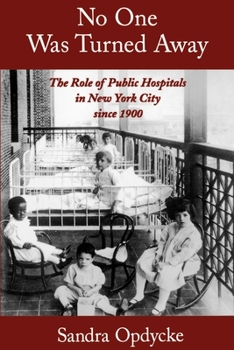No One Was Turned Away: The Role of Public Hospitals in New York City Since 1900
Select Format
Select Condition 
Book Overview
No One Was Turned Away is a book about the importance of public hospitals to New York City. At a time when less and less value seems to be placed on public institutions, argues author Sandra Opdycke, it is both useful and prudent to consider what this particular set of public institutions has meant to this particular city over the last hundred years, and to ponder what its loss might mean as well. Opdycke suggests that if these public hospitals close or convert to private management--as is currently being discussed--then a vital element of the civic life of New York City will be irretrievably lost. The story is told primarily through the history of Bellevue Hospital, the largest public hospital in the city and the oldest in the nation. Following Bellevue through the twentieth century, Opdycke meticulously charts the fluctuating fortunes of the city's public hospital system. Readers will learn how medical technology, urban politics, changing immigration patterns, economic booms and busts, labor unions, health insurance, Medicaid, and managed care have interacted to shape both the social and professional environments of New York's public hospitals. Having entered the twentieth century with high hopes for a grand expansion, Bellevue now faces financial and political pressures so acute that its very future is in doubt. In order to give context to the Bellevue experience, Opdycke also tracks the history of a private facility over the same century: New York Hospital. By noting the points at which the paths of these two mighty institutions have overlapped--as well as the ways in which they have diverged--this book clearly and persuasively highlights the significance of public hospitals to the city. No One Was Turned Away shows that private facilities like New York Hospital have generally provided superb care for their patients, but that in every era they have also excluded certain groups. This exclusion has occurred for various reasons, such as patients' diagnoses, their social characteristics, behavior, or financial status--or simply because of a lack of unoccupied beds. Fortunately, however, year in and year out, Bellevue and its fellow public facilities have acted as the city's medical safety net. Opdycke's book maintains that public hospitals will be as essential in the future as they have been in the past. This is a thoughtful and well-written study that will appeal to anyone interested in the history of medicine, public policy, urban affairs, or the City of New York.
Format:Paperback
Language:English
ISBN:0195140591
ISBN13:9780195140590
Release Date:September 2000
Publisher:Oxford University Press
Length:264 Pages
Weight:0.95 lbs.
Dimensions:0.8" x 6.1" x 9.2"
Customer Reviews
1 rating
The public's health
Published by Thriftbooks.com User , 23 years ago
Having spent most of my life in inner city academic medical institutions, I thought I knew much about the healthcare of the underprivileged. Having never worked in a truly public hospital, however, it wasn't until I read Opdyke's very readable book comparing a traditional academic, private hospital (New York Hospital) with a public one (Bellvue) that I could understand the real difference between the two. The book is well-written and easily read. There are sufficient facts to support her premises. It is a mark the book's worth, that I only lament that the author condensed some time periods that could have been even more detailed. Still, this is a must read for anyone commited to healthcare, but who has never had the experience of working in a public hospital. It raises many important issues that must be solved if universal healthcare is ever to become a reality in this country. Five stars!





